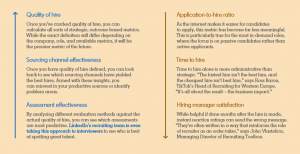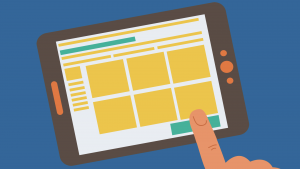As Jim Morrison howled in “Roadhouse Blues,” “The future’s uncertain and the end is always near.” FYI — if you’re a Zoomer or young Millennial — Jim Morrison was the lead singer of the band The Doors. Ask your parents about them if you’re curious.
Getting back on track, over the last decade, that quote by Morrison has never resonated more. We’ve experienced a devastating financial crisis, civil unrest, and a deadly global pandemic. And. the impact of climate change is beginning to rear its ugly head.
Additionally, the economic environment has thrown many young people off their goals. In these times of stagnant wages, child care, medical expenses, and education costs have surged. It comes as no surprise then that one-quarter of US adults don’t think they will ever save enough to retire comfortably.
In short, young adults no longer believe in long-term security. So, what’s the point in saving for an uncertain future? Well, it can provide financial security, which would probably help calm your anxiety about the future just a little.
But, even if you feel like tomorrow is all doom and gloom (which it’s not) — your savings will help you achieve short-term goals, like traveling or starting your own business.
In short, even if the future is uncertain, saving is a win-win strategy. And, it’s not really all that difficult if you take the following steps.
Learn how to cope with uncertainty.
“Uncertainty is all around us, never more so than today,” write Lawrence Robinson and Melinda Smith, M.A. for HelpGuide. “Whether it concerns a global pandemic, the economy, or your finances, health, and relationships, much of what lies ahead in life remains uncertain. Yet as human beings, we crave security.”
Our health and well-being are connected to feeling safe and having control over our lives. “Fear and uncertainty can leave you feeling stressed, anxious, and powerless over the direction of your life,” they add. As a result, you can easily become overwhelmed with endless “what-ifs” or worst-case scenarios about the future.
“We’re all different in how much uncertainty we can tolerate in life,” Robinson and Smith state. “Some people seem to enjoy taking risks and living unpredictable lives, while others find the randomness of life deeply distressing.” Regardless, all of us have a limit.
How to deal with uncertainty.
The good news? Knowing that you’re not alone is a great relief in times of confusion and worry. After all, many people are in the same situation as you are. But, if you’re still struggling with this, here are some ways that you can learn how to cope with any type of uncertainty;
- Take action over the things you can control. When dealing with a financial crisis, like job uncertainty, you still have control over how much energy you put into searching online for jobs, submitting resumes, or networking.
- Challenge your need for certainty. Consider the advantages of uncertainty, knowing how much you can realistically plan, and stop overestimating the negative.
- Learn to adapt to uncertainty. Identify your triggers and when you feel the need for uncertainty. And, don’t be afraid to occasionally give in to the unknown.
- Focus on the present. “One of the surest ways to avoid worrying about the future is to focus on the present,” Robinson and Smith write. “Instead of trying to predict what might happen, switch your attention to what’s happening right at this very moment.” By aligning with the present you can shut down the negative predictions and assumptions that run through your head.
- Manage stress and anxiety. Finally, eat a healthy diet, get enough sleep, exercise, meditate, and reach out for help if needed.
Adjust your budget.
I’m not exactly sure what coined the term, but it’s true that everything can change in the blink of an eye. Since it’s still unfortunately fresh on our minds, COVID-19 certainly proved this point.
As a consequence, the budget you’ve set and have been diligently following may not be relevant. Even if that’s not exactly true, it wouldn’t hurt to reevaluate and update your budget to play it safe.
The good folks over at Rockland Trust Bank recommend that you follow these four steps when modifying your financial plan:
- Take stock where you are financially. You must first evaluate where you are financially in order to adjust your budget. Look at your bank accounts and how changes have affected your finances. If you receive a paycheck, unemployment benefits, or other adjustments, specify how that money is coming into your budget.
- Reprioritize spending. Organize your expenses by categorizing them as essential, discretionary, and unimportant. Comparing the income you have coming in with the money going out will help you determine your expenditures. Consider reducing discretionary spending if your expenses are more than what you receive. If you have lower expenses than income, now may also be a good time to reduce expenses as well so that if income changes in the future you will be able to save more money.
- Reflect on your financial goals. Goals aren’t set in stone and financial planning isn’t a race. You have every right to adjust your goals and timeline during unprecedented situations.
- Learn more about other retirement saving options. You may find that you have to reduce your retirement contributions or even borrow from your retirement fund as your income changes. If you are young, do not succumb to the temptation. Saving for retirement can be done over time, but it’s best to start early.
Arm yourself with the right tools.
Are you saving for short-term goals? If so, look into FDIC-insured deposit accounts, such as:
- Savings account.
- Certificates of deposit (CDs), which lock the money in for a fixed term at a higher rate than savings accounts.
What long-term goals? Consider these options;
- Tax-efficient savings account that’s insured by the FDIC, like an individual retirement account (IRA).
- Investing in securities, such as stocks and mutual funds. An investment account with a broker-dealer can provide these investment products. The FDIC does not insure securities, they are not deposits of banks, and they are not guaranteed by banks. Investing in them involves investment risks, including the possibility of principal loss.
- If you’ve maxed out your 401(k) and want a guaranteed income later in life, then explore getting an annuity.
Also, choose as many accounts as you want to diversity your portfolio. You should, however, carefully evaluate all your options and take into account the minimum balances, fees, and interest rates. This can help you find the right combination that will help you achieve your goals.
Build (or replenish) your emergency fund.
The financial community has been preaching the importance of an emergency fund for years, leaving people wondering, “Why?” Again, COVID, anyone?
When you don’t earn as much as you were used to, emergency funds help you overcome barriers to overcome uncertainty. Hopefully, you should be able to gauge how much money you have in your emergency fund. Ideally, there should be at least three months’ worth of fixed expenses in it. If not, then it’s not sufficient.
Unless you currently have a precarious financial situation, you should do everything you can to pad your emergency fund to this three-month threshold. In case your situation is less stable and you can’t save enough for three months, try to save $ 1,000 ASAP — even if that means not paying off your debt as quickly. After all, what’s the point of having a zero balance on your credit card when a financial emergency could lead you to max it out?
Supplement your income.
In addition to supplementing your income, diversifying your income streams, and strengthening your emergency fund and other financial planning exercises, a side gig can replace an income stream. Or, it can be a safety blanket if you’re concerned about job security in the future.
You can also prioritize savings by finding a side gig before falling into a financial crisis. The loss of income will be offset, if and when that disruption occurs. If you don’t lose your job, the side gig earnings can help you save for retirement, vacations, or whatever financial goals you’ve set.
Don’t fall into the “buy the dip” trap.
As market fluctuations and economic recessions worsen, investors see them as opportunities for stock investments at a better price. Because of this, some recommend that when uncertainty is causing the price of stocks and other assets to drop, consider investing your money in these assets.
However, experts say that this investment strategy doesn’t work.
“When the stock market is going through a sell-off, you may not be able to buy the dip, because of your emotions,” Callie Cox, senior investment strategist with Ally Invest, told The Washington Post. “Buy the dip is one of those things that works really well on paper, but it doesn’t work well in real life. It’s something that I personally struggle with because as an investor, I want to buy the dip, but I’m human and sometimes I don’t feel good when the market’s going down. Buy the dip is market timing.”
“The issue with buying the dip as a strategy is that you can end up sitting out of the market for those long periods of time when it rallies,” added Dan Egan, director of behavioral finance and investing at the online investment firm Betterment.
Don’t dip, be consistent.
Instead, Cox champions for dollar-cost averaging. With this strategy, you invest the same amount of money consistently no matter the stock price.
“The world tends to frame investing as an all-or-nothing pursuit,” Cox writes in a market report. “You’re either all in and bullish, or on the sidelines with no skin in the game. But in reality, many people tend to gradually put their money in the market based on the calendar, instead of trying to guess the next top or bottom. That’s a strategy called dollar-cost averaging, and it rewards consistency over timing.”
Also, a dollar-cost averaging approach will allow you to eventually buy during dips.
“Dollar-cost averaging works really well because, if you’re investing a fixed amount of money at different times, you naturally buy fewer shares when the share price is high and then more shares when the share price is low, so you get a little more exposure to those dips when they happen,” Cox said.
Repair your credit score.
When your credit score is excellent, you probably aren’t using credit to make certain purchases. If you need credit to bridge financial gaps due to changes in your circumstances, however, your credit score can drop. As a result, this makes it harder to qualify for credit when you need it.
You can prevent credit problems by keeping your score high ahead of time. Don’t forget to pay your bills on time, pay down your credit card balances, and review your credit report for any errors. Even if you have a damaged credit score, this should repair it so if you need credit in the future, you’ll be able to obtain it.
Consider life insurance.
If you died or became incapacitated from work, what would your children or spouse do financially? It’s a question we don’t ask ourselves often enough.
A life insurance policy serves to provide a lump sum payment, or regular payouts, to those left behind in the event of your death. They can then use this money to cover monthly expenses, the mortgage, or college tuition.
It is especially important for self-employed people to think about what might happen if they got sick or are disabled. A person’s earnings may be replaced with a life insurance policy if they become unavailable for work due to a medical condition.
It’s advisable to seek advice and do your research before buying the first or cheapest life insurance policy you come across. You need to make sure that the product you choose is suitable for you, your family, and your lifestyle.
Have “go-to” people who can help you every step of the way.
Being able to reach out to people you can trust in difficult times can be a lifesaver. After all, no one expects you to be a financial expert. Luckily, what you don’t know can be filled in by people and organizations that you can trust.
Enjoy your life.
Being stressed about what’s happening and facing uncertainty is completely normal. Financially, some of us have never experienced unsettled conditions like what we did during the pandemic. Even so, you need to take time to yourself and even spend a few dollars on things that make you happy — regardless of everything going on right now and how uncertain the future may appear.
To move forward we must take care of ourselves first.
Business & Finance Articles on Business 2 Community(67)
Report Post






